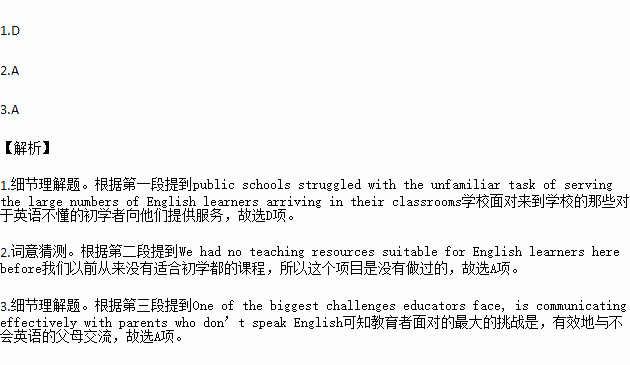题目内容
D
As thousands of communities in the USA — especially in the South — became booming gateways for immigrant families from Central and South America during the 1990s and the early years of the new century, public schools struggled with the unfamiliar task of serving the large numbers of English learners arriving in their classrooms.
Education programs needed to be built from scratch. “We had no teaching resources suitable for English learners here before. We had to develop them all ourselves,” a Texas principal said. Throughout the country, districts had to train their own teachers to teach English to non-native speakers or recruit (招聘)teachers from elsewhere. School staff members had to figure out how to communicate with parents who spoke no English.
But even as immigration has slowed or stopped in many places, and instructional programs for English-learners have matured, serving immigrant families and their children remains a work in progress in many public schools, especially those in communities that are skeptical, or sometimes unwelcoming, to the newcomers. One of the biggest challenges educators face, is communicating effectively with parents who don’t speak English — an issue that, in part, has contributed to recent complaints of discrimination by Latino students in some cities.
“The parents’ role is very important for the success of these students, but it's also one of the most difficult things we’ve had to tackle(处理),” said Jim D. Rollins, the president of the Springdale school district, where the 19,000-student school system has gone from having no English-learners 15 years ago to more than 7,500 now. “You have to make it a priority and work on it, work on it, and work on it.”
Aside from the practical challenges, such as finding bilingual (会说两种语言的) staff members, guiding districts through such dramatic changes requires school leaders to bridge difficult political and cultural divides. For school leaders in the South, especially in the last few years, this difficult job has been made harder still by the negative attitudes of some locals towards immigrants.
1.According to the passage, what is the problem that public schools are facing?
A. Handling more cases from the immigrant Mexican communities.
B. Offering services to immigrant families in the southern states.
C. Offering enough communicative lessons to immigrant parents.
D. Providing education for non-native English learners.
2.The underlined part “built from scratch” (in Paragraph 2) probably means “________”.
A. completely new
B. painful to make
C. based on past experience
D. constructed gradually
3.What do we know about the immigrant parents?
A. Many of them cannot speak English.
B. Most of them think education is not important.
C. Some of them feel skeptical about the local community.
D. Few of them have attended American schools.



